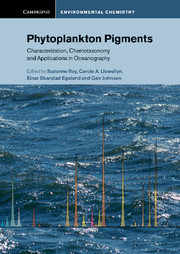Book contents
- Frontmatter
- Contents
- Contributors
- Preface
- Acknowledgements
- Abbreviations and symbols
- Part I Chlorophylls and carotenoids
- 1 Microalgal classes and their signature pigments
- 2 Recent advances in chlorophyll and bacteriochlorophyll biosynthesis
- 3 Carotenoid metabolism in phytoplankton
- Part II Methodology guidance
- Part III Water-soluble ‘pigments’
- Part IV Selected pigment applications in oceanography
- Part V Future perspectives
- Part VI Aids for practical laboratory work
- Part VII Data sheets aiding identification of phytoplankton carotenoids and chlorophylls
- Index
- Plate Section
- References
1 - Microalgal classes and their signature pigments
Published online by Cambridge University Press: 05 March 2012
- Frontmatter
- Contents
- Contributors
- Preface
- Acknowledgements
- Abbreviations and symbols
- Part I Chlorophylls and carotenoids
- 1 Microalgal classes and their signature pigments
- 2 Recent advances in chlorophyll and bacteriochlorophyll biosynthesis
- 3 Carotenoid metabolism in phytoplankton
- Part II Methodology guidance
- Part III Water-soluble ‘pigments’
- Part IV Selected pigment applications in oceanography
- Part V Future perspectives
- Part VI Aids for practical laboratory work
- Part VII Data sheets aiding identification of phytoplankton carotenoids and chlorophylls
- Index
- Plate Section
- References
Summary
Introduction
The microalgae that make up the extensive phytoplankton pastures of the world's oceans originated in ancient evolutionary times. They obtained their primitive ‘plastids’ from an unknown ancestral cyanobacterium with photosynthetic oxygen-evolving capabilities (Bhattacharya, 1997; Delwiche, 1999; McFadden, 2001; Palmer, 2003; Keeling, 2004a, b). Serial symbioses within heterotrophic hosts gave rise to the present wide diversity of photosynthetic microalgae, which evolved a range of photosynthetic pigments capable of collectively harvesting most of the wavelengths of light available to them in underwater marine habitats (Jeffrey and Wright, 2006).
At the present time, the marine phytoplankton contribute at least a quarter of the biomass of the world's vegetation, and constitute the base of the food web that supports either directly or indirectly all the animal populations of the open sea. Some microalgae also contribute significantly to climatic processes, providing nuclei for atmospheric water condensation (Aiken et al., 1992). All microalgae, by their photosynthetic activities, contribute to atmospheric carbon dioxide ‘draw-down’ (Jeffrey and Mantoura, 1997), thus helping to ameliorate green-house gases, by removing nearly a third of the anthropogenic carbon released to the atmosphere (Sabine and Feely, 2007).
- Type
- Chapter
- Information
- Phytoplankton PigmentsCharacterization, Chemotaxonomy and Applications in Oceanography, pp. 3 - 77Publisher: Cambridge University PressPrint publication year: 2011
References
- 94
- Cited by

